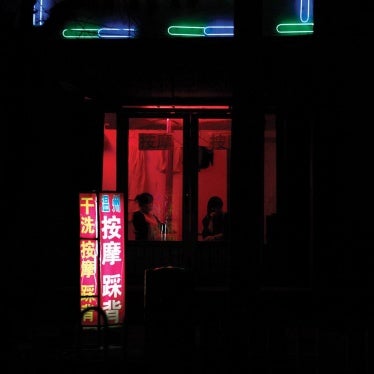After fleeing the May 13 massacre in Andijan, Uzbek asylum seekers in Kyrgyzstan now face the danger of unlawfully being sent back to Uzbekistan, where they would be at risk of torture and other grave abuses, Human Rights Watch said today.
Western governments should press the Kyrgyz authorities to allow the Uzbek asylum seekers to be safely resettled to countries outside the region, Human Rights Watch said. Human Rights Watch also called on the United Nations High Commissioner for Refugees to prepare an emergency plan for the humanitarian evacuation of all Uzbek asylum seekers and refugees from Kyrgyzstan should the situation there suddenly deteriorate.
Nearly 450 Uzbek men, women and children sought refuge in Kyrgyzstan after the May 13 massacre in which Uzbek forces shot and killed hundreds of unarmed protesters in Andijan. The Uzbek government continues to put immense pressure on the Kyrgyz authorities to return the asylum seekers, which would violate Kyrgyzstan’s obligations under international law.
“It’s hard to imagine a group of people more at risk,” said Holly Cartner, Europe and Central Asia director for Human Rights Watch. “The Uzbek asylum seekers remain extremely vulnerable as long as they are in Kyrgyzstan, and they would be at serious risk of torture if returned to Uzbekistan. Safe and voluntary resettlement outside the region is the only viable option.”
The U.N. High Commissioner for Refugees (UNHCR) is currently approaching countries that would resettle the Uzbek asylum seekers, starting with those at the most immediate risk: the 29 now detained by Kyrgyz authorities in Osh.
“States asked by the U.N. to take these asylum seekers should quickly agree,” said Cartner. “Meanwhile, Western governments must exert diplomatic influence on Kyrgyzstan to ensure that none are returned to Uzbekistan before they can be resettled.”
On June 10, the Kyrgyz authorities returned four Uzbek asylum seekers to Uzbekistan. No international organization has had access to the four since their return and there are serious fears for their well-being.
Despite promises to the United Nations and others that it would not engage in any further forcible returns, the Kyrgyz government has indicated that it will soon start returning the 29 Uzbek asylum seekers detained in Osh to Uzbekistan. Human Rights Watch staff on the ground have also learned that Kyrgyz authorities intend to detain another 40 or more Uzbeks at the Sasyk refugee camp in Jalal-Abad in apparent preparation to return them to Uzbekistan. To date, the Uzbeks have requested the extradition of a total of 133 of the asylum seekers.
Uzbekistan has a well-documented record of committing torture and other mistreatment. In 2003, the U.N. Special Rapporteur on Torture found torture in Uzbekistan to be “systematic.” There is no evidence that the situation has improved since that date.
Kyrgyzstan is a party to the 1951 Refugee Convention and has an obligation not to return refugees to a place where they would face persecution. The Convention Against Torture, to which Kyrgyzstan is also a party, prohibits states from sending persons—for whatever reason—to a country where there are substantial grounds for believing they would be tortured. These prohibitions under international law take legal precedence over any extradition agreements between Kyrgyzstan and Uzbekistan.
As part of its efforts to cover up its role in the massacre in Andijan on May 13, the Uzbek government has been placing massive pressure on the Kyrgyz government to send back these asylum seekers. Family members of the asylum seekers have been threatened with imprisonment by the Uzbek government if they fail to convince their relatives to return to Uzbekistan. Uzbek security forces near the camp in Kyrgyzstan are believed to have access to the camp, posing a danger to those sheltered there. A Human Rights Watch researcher recently witnessed an attempt by two unidentified men to drag an asylum seeker out of his tent and to the camp entrance. The men were stopped only after camp security officials intervened. Western governments should pressure Uzbekistan not to threaten or otherwise harass the families of those who have sought refuge abroad.
The Assistant U.N. High Commissioner for Refugees, Kamal Morjane, stated on June 27 that Uzbek security forces appeared to have access to the camp and that there have been threats of asylum seekers being abducted by Uzbek authorities.
Any transfer of refugees or asylum seekers from Kyrgyzstan should take place under the scrutiny of UNHCR Protection Officers to ensure they are not threatened or abducted en route by Uzbek agents.
Kyrgyzstan remains responsible to receive and protect any further asylum seekers who may flee Uzbekistan, including those living outside of the camp in Kyrgyz territory. The Kyrgyz government should not regard international resettlement or evacuation plans as permission to shirk its refugee or human rights obligations.







